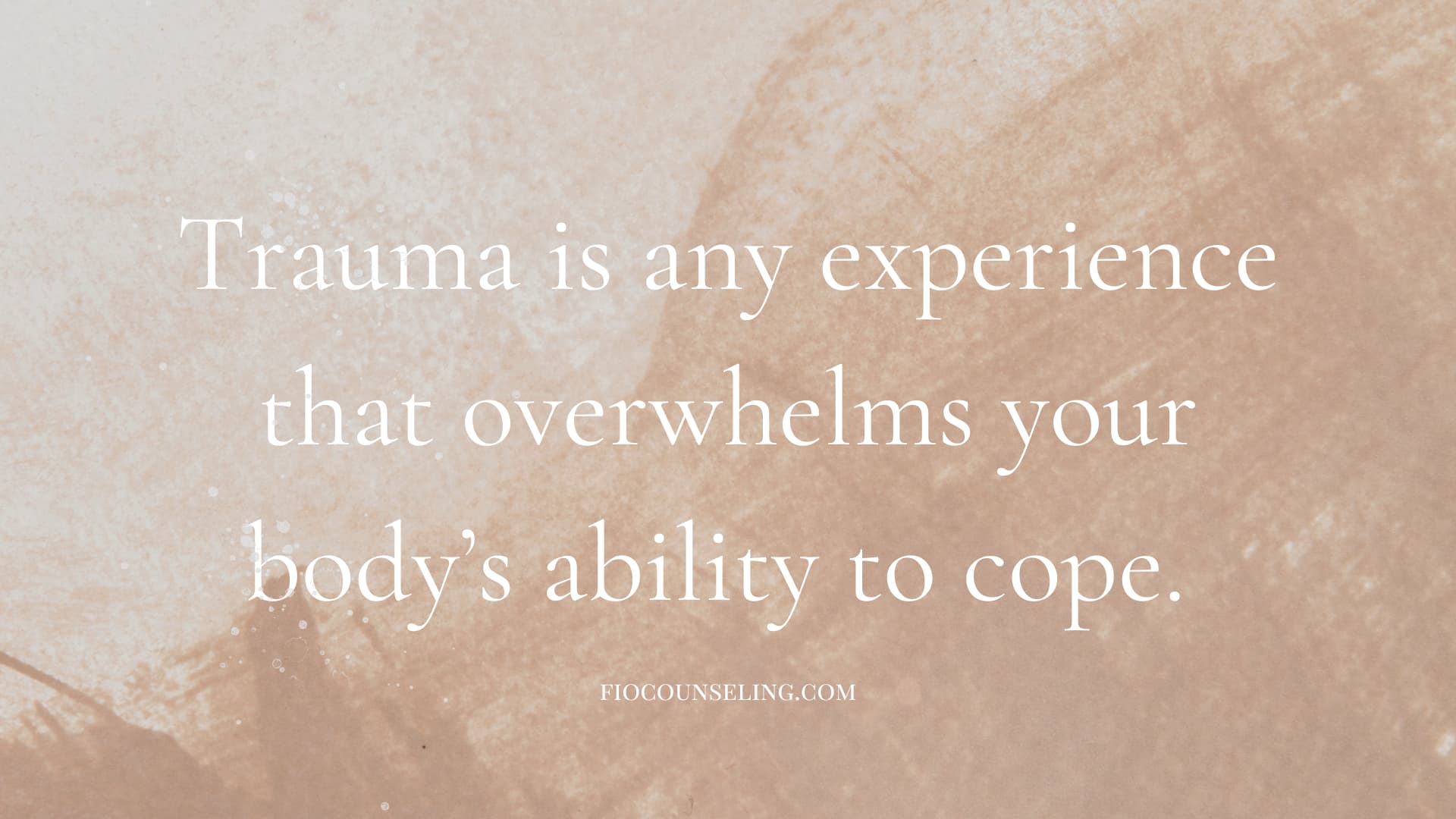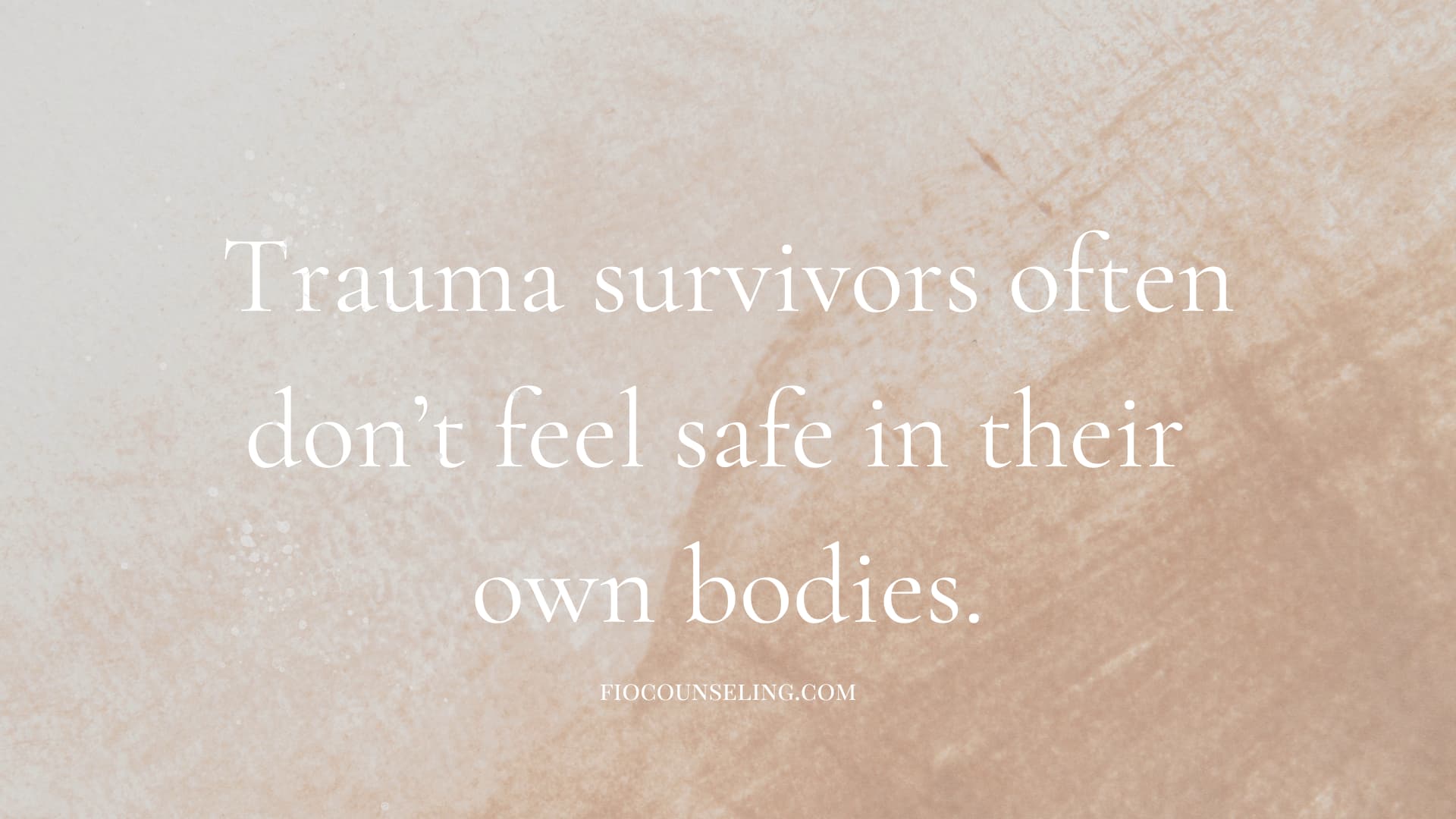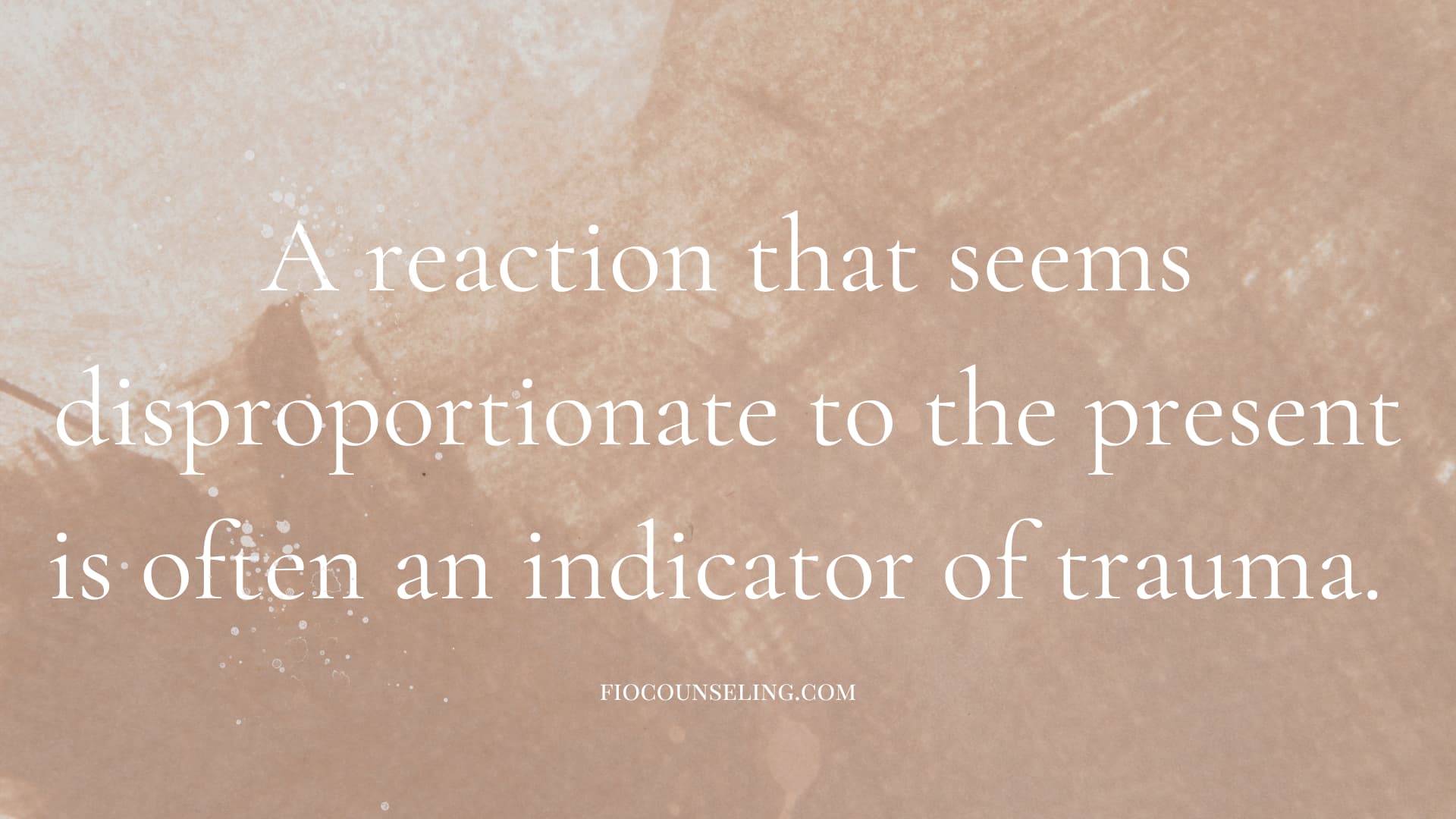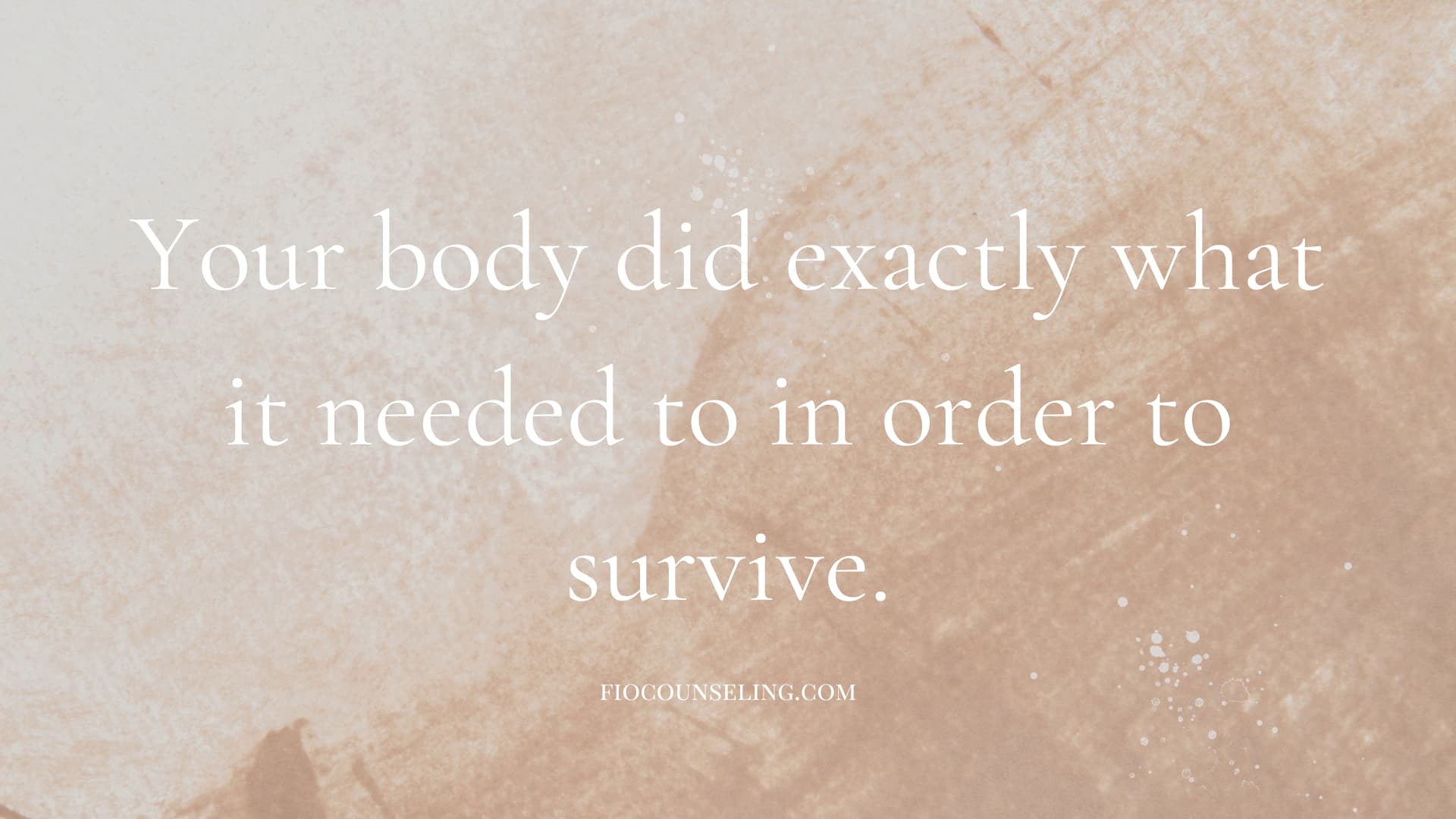Trauma 101: A Beginner’s Guide to Navigating Trauma
Trauma: It blows up your life. It turns everything upside down.
It’s disorienting. Disruptive. And devastating. It disconnects you from the present, and it creates a distinct feeling of before and after.
Everything that once felt familiar is unrecognizable. Safety and security seem like folklore. It impacts every corner and crevice of life.
And most importantly, it overwhelms.
What Is Trauma?
Trauma is any experience that overwhelms your body’s ability to cope.
It’s too much too soon. Or not enough when you needed it (i.e., neglect, abandonment, etc.). In either case, trauma “overwhelm the ordinary systems of care that give people a sense of control, connection, and meaning” according to trauma expert Judith Herman.
The event isn’t what determines whether something is traumatizing. As trauma expert Gabor Mate suggests, “Trauma is not what happens to you. Trauma is what happens inside you as a result of what happened to you.”
The way your brain and body are impacted by an experience determines whether or not something is traumatizing.

How Does Trauma Impact You?
Trauma evokes an experience of helplessness, powerlessness, and aloneness.
It steals one’s sense of power and control. And it influences how survivors see themselves, relationships, and the world around them.
Trauma survivors’ sense of self and identity are shattered in the wake of trauma. As Herman explains, “their self-esteem is assaulted by experiences of humiliation, guilt, and helplessness” and “the identity they have formed prior to the trauma is irrevocably destroyed.” This is even more detrimental when trauma takes place in childhood while identity is in the process of developing.
Trauma survivors’ internal framework for understanding life, and making meaning, are dismantled. And one of the biggest casualites as a result? Trust. Trauma survivors tend to struggle to trust themselves and others.
Their body is no longer a safe haven, but a war zone filled with landmines of trauma memories, flashbacks, unexpected bodily responses, and triggers threatening to transport them back in time.
Spaces and people that once signaled safety now carry unexplainable risk. Trauma erodes basic assumptions about the safety of the world, resulting in survivors moving through life with distrust.
And due to feeling absolutely alone, abandoned, exposed, or unprotected during the traumatic experience, survivors feel a pervasive disconnect in their relationships. They experience alienation and isolation, always feeling like nobody really understands them.
It doesn’t feel safe to be seen or known, and it doesn’t feel safe to show up authentically.

How Do You Know If You’ve Experienced Trauma?
This is by no means an exhaustive list, but here are a few hallmark signs of trauma:
#1: Difficulty Regulating
You struggle regulating your emotions and internal experience. You find yourself experiencing emotions and sensations that seem disproportionate to your present reality, and yet can’t seem to lessen the intensity of what you feel.
As trauma expert Pat Ogden suggests, “The byproduct of trauma is an unregulated body experience, an uncontrollable cascade of strong emotions and physical sensations. Traumatized people frequently experience themselves as being at the mercy of their sensations, as well as emotions, having lost the capacity to effectively regulate these functions.”
Dysregulation may show up for you through anxiety or hypervigilance, always feeling alert to potential threats and danger. Or through shutting down, numbness, or dissociating.
In any case, living from a place of dysregulation impacts every part of your life. It impacts your capacity to connect with others, be present, feel in-control, access safety, and deal with stress.
#2: Difficulty In Relationships
Trauma may be a part of your story if you experience a trend of relationship challenges with yourself and others.
Now I’m not referring to the average and typical relationship problems that are just part of being human. I’m talking about a chronic, pervasive pattern of problems in your relationships.
When you look back across your life, do you see a theme of either broken relationships or inauthentic ones? Is there a pattern of one-sided relationships, people-pleasing tendencies, disconnection, or avoidance to conflict in your relationships?
Do you see a pattern of toxic or harmful partners? Or a pattern of you causing harm in your relationships?
And how about your relationship with yourself? Do you feel disconnected from yourself? Is your inner dialogue harsh, critical, demanding? Do you have a complicated relationship with receiving kindness, comfort, and care from others or yourself?
You May Also Experience The Following After Trauma:
- Exaggerated startle response
- Disrupted sleep or decrease in quality of sleep
- Increased irritability
- Nightmares and/or flashbacks
- Avoidance of trauma-related stimuli
- Hypervigilant to the return of trauma-related threats
- Reenacting the traumatic event in a conscious or subconscious attempt to resolve the trauma or change the outcome
Please don’t dismiss your experience if you don’t have specific memories, or if you can’t pinpoint something that’s happened to you. In fact, having no memory of traumatic experiences is very common due to how your brain and body functions at the time of the trauma.
Your body is a truth-teller. It has no reason to lie. And it remembers even if conscious memory isn’t there.

Different Types of Trauma
Big T, little T, what begins with T.
Big-T trauma is the life-threatening experience we typically think of when we think of trauma, such as war, natural disaster, assault, abuse, etc. (or observing people endure these experiences).
Little-T trauma is the result of a collection of experiences that are too overwhelming for your body to process, but less obvious than the Big-T trauma. This type of trauma may occur through emotional needs chronically going unmet, ongoing unavailability from caregivers, constant instability and unpredictability, bullying, or ongoing criticism, just to name a few. This type of trauma is no less impactful or overwhelming for your nervous systems to process.
Trauma comes in many different flavors. Here’s a snapshot of several common types of trauma:
Developmental Trauma:
Adverse experiences occuring in childhood that disrupt the natual course of development.
Relational Trauma:
Trauma resulting from harmful dynamics in a relationship, such as abuse, neglect, maltreatment, betrayal, or abandonment.
Sexual Trauma:
Trauma resulting from sexual violence in any context.
Religious/Spiritual Trauma (aka Adverse Religious Experiences):
Trauma resulting from religious beliefs, practices, leaders, and communities that “undermines a person’s sense of safety, autonomy, or agency, and negatively impacts their physical, social, emotional, relational, or psychological wellbeing” according to Hillary McBride.
Physical Trauma:
Trauma involving physical harm or injury, such as a car accident or domestic violence.
Complex Trauma (aka C-PTSD):
Repeated exposure to traumatic experiences rather than a single moment of trauma.
Vicarious Trauma:
Second-hand trauma often absorbed by those who work with trauma survivors or have supported loved ones through their trauma.
Collective Trauma:
Trauma experienced by entire communities and groups in the wake of events like war, natural disasters, COVID-19, and racism/prejudice.
Racial Trauma:
Trauma caused by racism, racial injustice, and discrimination.
Medical Trauma:
Trauma resulting from distressing medical procedures or experiences within the healthcare system.
Environmental Trauma:
Trauma caused by environmental disasters or crises, such as natural catastrophes and climate change.
Military Trauma:
Trauma experienced by military personnel due to chronic stress, challenges of deployment, frequent relocation and PCSing, or in the wake of war and combat.
People-pleasers are notorious for discounting their experiences and downplaying what’s happened to them. If that’s you, please know that your experience isn’t any less significant or valid if it seems like it could’ve been ‘worse’.
Understanding Trauma Responses
Many trauma survivors carry a lot of shame about how they responded during a traumatic experience. They beat themselves up for not escaping, screaming for help, or fighting back. They can’t understand why they froze or shut-down or blacked out.
When the truth is that your body did what it needed to survive. To keep you safe.
Your nervous system, the very thing designed to keep you alive, automatically functioned on your behalf to protect you in the way that it could access at the time. If fighting or fleeing wasn’t an option, it shut down.
And if the trauma happened in childhood, your options for surviving the trauma were even more limited.

Healing Trauma
Trauma demands survival. But you weren’t meant to merely survive. And what has helped you survive may prevent you from thriving. Healing trauma involves looking at the things keeping you stuck in survival mode and exploring how to:
- Reclaim power and control in healthy ways.
- Rediscover a felt sense of safety.
- Expand your tolerance to work with, and shift, the adaptive strategies birthed out of trauma (such as people-pleasing, perfectionism, overworking, undesirable substance use, etc.) while staying connected to a sense of safety.
Trauma therapy focuses on incrementally transforming the strategies that have helped you survive into resources that empower you to take back your life and live in the present instead of the past.
Trauma therapy invites you to stop white-knuckling and start honoring the pace needed for you to untangle from everything stopping you from embracing the fullness of your one and only life.
Next Steps: Explore Trauma Therapy with a Therapist in Denver, Colorado
If you’re feeling overwhelmed by your trauma, consider trauma therapy at Fio. Get started by following these 3 simple steps:
- Schedule a free 20-minute consult call at a time that’s convenient for you.
- Book your first appointment as soon as you’re ready and get connected with a Colorado trauma therapist at Fio Counseling.
- Find support and begin healing your trauma!

About the Author: Ali Arteaga, LPCC
Ali Arteaga (she/her) is a trauma therapist and the founder of Fio Counseling, a mental health therapy practice in Colorado. With a passion for connection, compassion, and curiosity, Ali is dedicated to helping her clients reclaim their lives from trauma and live abundant, authentic lives.
Embracing her own healing journey through complex trauma led Ali to devote her life to helping others feel at home within themselves. She’s been there (personally and professionally) and is a gentle, compassionate guide helping you find your way back to you.
Ali honors the uniqueness of your story and meets you where you’re at. She weaves in evidenced-based modalities such as Internal Family Systems (IFS) therapy and somatic therapy into her work with clients.
